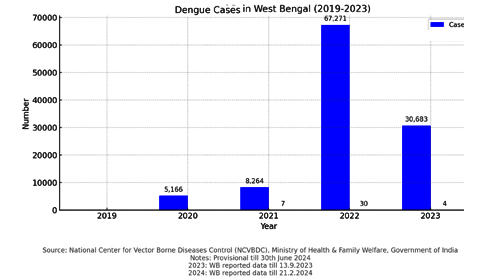
West Bengal Doctor Succumbs to Dengue in Chandannagar
A tragic reminder of the ongoing dengue crisis in West Bengal occurred when a 47-year-old doctor, Swati De, tragically lost her life to the disease early Tuesday morning. Dr. De, who had been experiencing a high fever for several days, received a diagnosis of dengue after undergoing blood tests. Her platelet count sharply dropped after her transfer to Kolkata's SSKM Hospital due to her deteriorating condition, resulting in a tragic cardiac arrest. The death certificate indicated that dengue was the underlying cause.
Dr. De, who lived in Hatkhola, Chandannagar, leaves behind her husband, a fellow doctor currently serving in Cooch Behar. Her death highlights the fragility of even those in the healthcare field amidst this uncontrolled outbreak.
Media reports indicate that the state health department’s data reveals a concerning situation, with more than 25,000 dengue cases documented from January to November this year. Government hospitals reported more than 20,000 positive cases, with private facilities adding an additional 5,000. The increasing figures underscore the shortcomings in monitoring diseases, preventive measures, and prompt medical responses.
In light of these concerning statistics, experts and healthcare workers express their disappointment regarding the state’s evident lack of preparedness. “The lack of a reliable early warning system, inadequate mosquito control efforts, and slow diagnostics are worsening the situation,” noted a public health expert.
Dr. De’s death highlights a significant concern: the challenges in tracking and managing the disease effectively. Although urban centers, such as Kolkata, have some capacity to manage dengue cases, smaller towns and rural areas face significant challenges due to insufficient resources. This difference frequently postpones essential treatment, resulting in avoidable loss of life.
Health officials indicate that initiatives, such as awareness campaigns and vector control measures, are currently in progress. However, the rise in cases suggests that the effectiveness or sufficiency of these measures may be questionable. The state's dependence on reactive measures instead of proactive strategies has faced considerable criticism.
The passing of Dr. De highlights the profound impact of the dengue epidemic on individuals and communities. It brings to light pressing concerns regarding the state's readiness and its dedication to safeguarding its citizens, particularly those working in healthcare settings.
As the year approaches its conclusion, public health experts emphasize the urgent need for action to prevent additional losses. Enhancing disease tracking, strengthening vector control initiatives, and ensuring fair access to prompt medical care are essential for preventing future crises. Until then, the state's struggle to manage the dengue outbreak continues to be a significant worry.